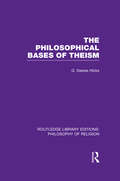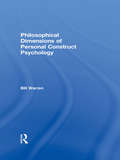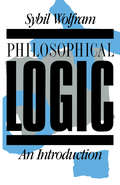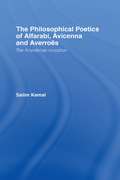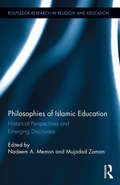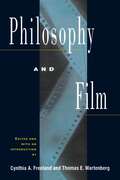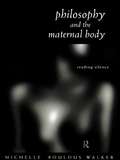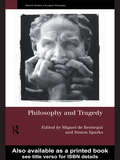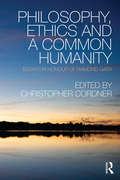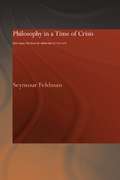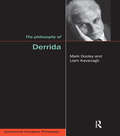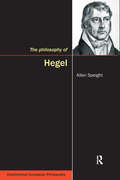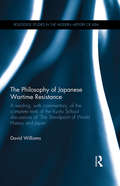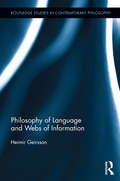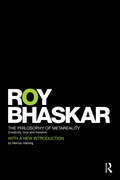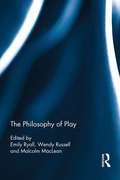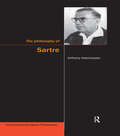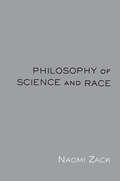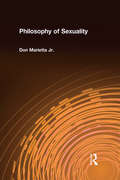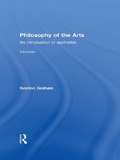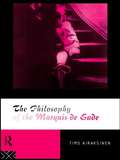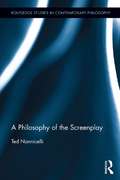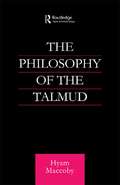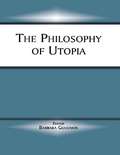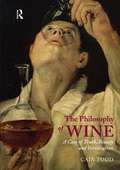Special Collections
Benetech’s Global Certified Accessible Titles
Description: Benetech’s GCA program is the first independent third-party EPUB certification to verify ebook accessibility. By creating content that is born accessible, publishers can meet the needs of all readers. Learn more: https://bornaccessible.benetech.org/
- Table View
- List View
The Philosophical Bases of Theism
by George Dawes HicksExcellently organised and written, this is a thorough examination of how philosophy interacts with religion. The chapters were originally presented as the Hibbert Lectures in 1931 at University College London and the University of Manchester. The texts are expanded and elaborated to present a cohesive text, first published in 1937. Exploring free rational thinking, the book encourages reflection on the principals on which religion rests and addresses themes such as knowledge and experience, evolution, positivism, mystical experience, divine immanence, beauty and morality.
Philosophical Dimensions of Personal Construct Psychology
by Bill WarrenThis book traces the philosophical history of Personal Construct Psychology through the broad and complex tradition of phenomenology and thinkers such as Spinoza, Hegel and Heidegger. The author also gives credit to the influence of general creative and dramatic literature across a variety of cultures. Specific issues addressed in depth include the position of Personal Construct Psychology with regard to philosophy of science, determinism and free will, concepts of mental illness and the implications for social and political philosophy.
Philosophical Logic
by Sybil WolframFirst published in 1989. Routledge is an imprint of Taylor & Francis, an informa company.
The Philosophical Poetics of Alfarabi, Avicenna and Averroes
by Salim KemalThis book examines the studies of Aristotle's Poetics and its related texts in which three Medieval philosophers - Alfarabi, Avicenna and Averroes - proposed a conception of poetic validity (beauty), and a just relation between subjects in a community (goodness). The work considers the relation of the Poetics to other Aristotelian texts, the transmission of these works to the commentators' context, and the motivations driving the commentators' reception of the texts. The book focuses on issues central to the classical relation of beauty to truth and goodness.
Philosophies of Islamic Education
by Mujadad Zaman and Nadeem A. MemonThe study of Islamic education has hitherto remained a tangential inquiry in the broader focus of Islamic Studies. In the wake of this neglect, a renaissance of sorts has occurred in recent years, reconfiguring the importance of Islam’s attitudes to knowledge, learning and education as paramount in the study and appreciation of Islamic civilization. Philosophies of Islamic Education, stands in tandem to this call and takes a pioneering step in establishing the importance of its study for the educationalist, academic and student alike. Broken into four sections, it deals with theological, pedagogic, institutional and contemporary issues reflecting the diverse and often competing notions and practices of Islamic education. As a unique international collaboration bringing into conversation theologians, historians, philosophers, teachers and sociologists of education Philosophies of Islamic Education intends to provide fresh means for conversing with contemporary debates in ethics, secularization theory, child psychology, multiculturalism, interfaith dialogue and moral education. In doing so, it hopes to offer an important and timely contribution to educational studies as well as give new insight for academia in terms of conceiving learning and education.
Philosophy and Film
by Cynthia A. Freeland and Thomas E. WartenbergPhilosophy and Film moves from broad theoretical reflections on film as a medium to concrete examinations of individual films.
Philosophy and the Maternal Body
by Michelle Boulous WalkerPhilosophy and the Maternal Body gives a new voice to the mother and the maternal body which have often been viewed as silent within philosophy. Michelle Boulous Walker clearly shows how some male theorists have appropriated maternity, and suggests new ways of articulating the maternal body and women's experience of pregnancy and motherhood.
Philosophy and Tragedy
by Miguel De Beistegui and Simon SparksFrom Plato's Republic and Aristotle's Poetics to Nietzsche's The Birth of Tragedy, the theme of tragedy has been subject to radically conflicting philosophical interpretations. Despite being at the heart of philosophical debate from Ancient Greece to the Nineteenth Century, however, tragedy has yet to receive proper treatment as a philosophical tradition in its own right. Philosophy and Tragedy is a compelling contribution to that oversight and the first book to address the topic in a major way. Eleven new essays by internationally renowned philosophers clearly show how time and again, major thinkers have returned to tragedy in many of their key works. Philosophy and Tragedy aks why it is that thinkers as far apart as Hegel and Benjamin should make tragedy such an important theme in their work, and why, after Kant, an important strand of philosophy should present itself tragically. From Heidegger's reading of Sophocles' Antigone to Nietzsche and Benjamin's book-length studies of tragedy, Philosophy and Tragedy presents an outstanding and original study of this preoccupation. The five sections are organised clearly around five major philosophers: Hegel, Holderlin, Nietzsche, Heidegger, and Benjamin
Philosophy, Ethics and a Common Humanity
by Christopher CordnerThe work of Raimond Gaita, in books such as Good and Evil: An Absolute Conception, A Common Humanity and The Philosopher’s Dog, has made an outstanding and controversial contribution to philosophy and to the wider culture. In this superb collection an international team of contributors explore issues across the wide range of Gaita’s thought, including the nature of good and evil, philosophy and biography, the unthinkable, Plato and ancient philosophy, Wittgenstein, the religious dimensions of Gaita’s work, aspects of the Holocaust, and aboriginal reconciliation in Australia.
Philosophy in a Time of Crisis
by Seymour FeldmanThe expulsion from Spain did not only result in the destruction and dispersion of Spanish Jewry but led to a crisis in Jewish faith. Don Isaac Abravanel provided a systematic treatment of the main philosophical and theological beliefs of Judaism in an attempt to resolve the inner doubts of his co-religionists. In their Italian exile his son Judah too recognized that Jews were now living in a new cultural world, but he forged a different road for Jews to pursue in their entry into the culture of the Renaissance. This book presents a picture of one family facing the challenges of a new era in Jewish history.
The Philosophy of Derrida
by Mark Dooley and Liam KavanaghFor more than forty years Jacques Derrida has attempted to unsettle and disturb the presumptions underlying many of our most fundamental philosophical, political, and ethical conventions. In The Philosophy of Derrida, Mark Dooley examines Derrida's large body of work to provide an overview of his core philosophical ideas and a balanced appraisal of their lasting impact. One of the author's primary aims is to make accessible Derrida's writings by discussing them in a vernacular that renders them less opaque and nebulous. Derrida's unusual writing style, which mixes literary and philosophical vocabularies, is shown to have hindered their interpretation and translation. Dooley situates Derrida squarely in the tradition of historicist, hermeneutic and linguistic thought, and Derrida's objectives and those of "deconstruction" are rendered considerably more convincing. While Derrida's works are ostensibly diverse, Dooley reveals an underlying cohesion to his writings. From his early work on Husserl, Hegel and de Saussure, to his most recent writings on justice, hospitality and cosmopolitanism, Derrida is shown to have been grappling with the vexed question of national, cultural and personal identity and asking to what extent the notion of a "pure" identity has any real efficacy. Viewed from this perspective Derrida appears less as a wanton iconoclast, for whom deconstruction equals destruction, but as a sincere and sensitive writer who encourages us to shed light on out historical constructions so as to reveal that there is much about ourselves that we do not know.
The Philosophy of Hegel
by Allen SpeightFew philosophers can induce as much puzzlement among students as Hegel. His works are notoriously dense and make very few concessions for a readership unfamiliar with his systematic view of the world. Allen Speight's introduction to Hegel's philosophy takes a chronological perspective on the development of Hegel's system. In this way, some of the most important questions in Hegelian scholarship are illuminated by examining in their respective contexts works such as the "Phenomenology and the Logic". Speight begins with the young Hegel and his writings prior to the "Phenomenology" focusing on the notion of positivity and how Hegel's social, economic and religious concerns became linked to systematic and logical ones. He then examines the "Phenomenology" in detail, including its treatment of scepticism, the problem of immediacy, the transition from "consciousness" to "self-consciousness", and the emergence of the social and historical category of "Spirit". The following chapter explores the Logic, paying particular attention to a number of vexed issues associated with Hegel's claims to systematicity and the relation between the categories of Hegel's logic and nature or spirit (Geist). The final chapters discuss Hegel's ethical and political thought and the three elements of his notion of "absolute spirit": art, religion and philosophy, as well as the importance of history to his philosophical approach as a whole.
The Philosophy of Japanese Wartime Resistance
by David WilliamsThe transcripts of the three Kyoto School roundtable discussions of the theme of ‘the standpoint of world history and Japan’ may now be judged to form the key source text of responsible Pacific War revisionism. Published in the pages of Chuo Koron, the influential magazine of enlightened elite Japanese opinion during the twelve months after Pearl Harbor, these subversive discussions involved four of the finest minds of the second generation of the Kyoto School of philosophy. Tainted by controversy and shrouded in conspiratorial mystery, these transcripts were never republished in Japan after the war, and they have never been translated into English except in selective and often highly biased form. David Williams has now produced the first objective, balanced and close interpretative reading of these three discussions in their entirety since 1943. This version of the wartime Kyoto School transcripts is neither a translation nor a paraphrase but a fuller rendering in reader-friendly English that is convincingly faithful to the spirit of the original texts. The result is a masterpiece of interpretation and inter-cultural understanding between the Confucian East and the liberal West. Seventy years after Tojo came to power, these documents of the Japanese resistance to his wartime government and policies exercise a unique claim on students of Japanese history and thought today because of their unrivalled revelatory potential within the vast literature on the Pacific War. The Philosophy of Japanese Wartime Resistance may therefore stand as the most trenchant analysis of the political, philosophic and legal foundations of the place of the Pacific War in modern Japanese history yet to appear in any language.
Philosophy of Language and Webs of Information
by Heimir GeirssonThe nature of propositions and the cognitive value of names have been the focal point of philosophy of language for the last few decades. The advocates of the causal reference theory have favored the view that the semantic contents of proper names are their referents. However, Frege’s puzzle about the different cognitive value of coreferential names has made this identification seem impossible. Geirsson provides a detailed overview of the debate to date, and then develops a novel account that explains our reluctance, even when we know about the relevant identity, to substitute coreferential names in both simple sentences and belief contexts while nevertheless accepting the view that the semantic content of names is their referents. The account focuses on subjects organizing information in webs; a name can then access and elicit information from a given web. Geirsson proceeds to extend the account of information to non-referring names, but they have long provided a serious challenge to the causal reference theorist.
The Philosophy of metaReality
by Roy BhaskarFirst Published in 2012. Routledge is an imprint of Taylor & Francis, an informa company.
The Philosophy of Play
by Emily Ryall and Wendy Russell and Malcolm MacLeanPlay is a vital component of the social life and well-being of both children and adults. This book examines the concept of play and considers a variety of the related philosophical issues. It also includes meta-analyses from a range of philosophers and theorists, as well as an exploration of some key applied ethical considerations. The main objective of The Philosophy of Play is to provide a richer understanding of the concept and nature of play and its relation to human life and values, and to build disciplinary and paradigmatic bridges between scholars of philosophy and scholars of play. Including specific chapters dedicated to children and play, and exploring the work of key thinkers such as Plato, Sartre, Wittgenstein, Gadamer, Deleuze and Nietzsche, this book is invaluable reading for any advanced student, researcher or practitioner with an interest in education, playwork, leisure studies, applied ethics or the philosophy of sport.
The Philosophy of Sartre
by Anthony HatzimoysisPlaywright, novelist, political theorist, literary critic and philosopher, Jean-Paul Sartre (1905-80) remains an iconic figure. This book examines his philosophical ideas and methods. It is an introductory guide for the student who wishes to understand Sartre's philosophical argumentation. It reconstructs in plain language key instances of Sartre's philosophical reasoning at work and shows how certain questions arise for Sartre and what philosophical tools he uses to address those questions. Each chapter considers a range of issues in the Sartrean corpus including his conception of phenomenology, the question of self-identity, the Sartrean view of conscious beings, his understanding of the self, his theory of value, human action as both the originator and the outcome of social processes, dialectical reason, and his conception of artistic activity. Hatzimoysis uncovers the philosophical argumentation, identifies Sartre's most important philosophical ideas and addresses the arguments in which those ideas are employed. Readers are able to get a real understanding of Sartre's approach to the activity of philosophising and how his method favours certain types of philosophical analysis.
Philosophy of Science and Race
by Naomi ZackFirst published in 2003. Routledge is an imprint of Taylor & Francis, an informa company.
Philosophy of Sexuality
by Don Marietta, Jr.This text offers a broad range of topics relating to the philosophy of sexuality. These include: morality; adultery; sex and gender differences; romantic love; gender-based speech; marriage; family and parenthood; feminism; and others.
Philosophy of the Arts
by Gordon GrahamPhilosophy of the Arts presents a comprehensive and accessible introduction to those coming to aesthetics and the philosophy of art for the first time. The third edition is greatly enhanced by new sections on art and beauty, modern art, Aristotle and katharsis, and Hegel. Each chapter has been thoroughly revised with fresh material and extended discussions. As with previous editions, the book: is jargon-free and will appeal to students of music, art history and literature as well as philosophy looks at a wide range of the arts from film, painting and architecture to fiction, music and poetry discusses a range of philosophical theories of thinkers such as Hume, Kant, Gaender, Collingwood, Derrida, Hegel and Croce contains regular summaries and suggestions for further reading.
The Philosophy of the Marquis de Sade
by Timo AiraksinenThe Marquis de Sade is famous for his forbidden novels like Justine, Juliette, and the 120 Days of Sodom. Yet, despite Sade's immense influence on philosophy and literature, his work remains relatively unknown. His novels are too long, repetitive, and violent. At last in The Philosophy of the Marquis de Sade, a distinguished philosopher provides a theoretical reading of Sade. Airaksinen examines Sade's claim that in order to be happy and free we must do evil things. He discusses the motivations of the typical Sadean hero, who leads a life filled with perverted and extreme pleasures, such as stealing, murder, rape, and blasphemy. Secondary sources on Sade, such as Hobbes, Erasmusm, and Brillat-Savarin are analyzed, and modern studies are evaluated. The Philosophy of the Marquis de Sade greatly enhances our understanding of Sade and his philosophy of pain and perversion.
A Philosophy of the Screenplay
by Ted NannicelliRecently, scholars in a variety of disciplines—including philosophy, film and media studies, and literary studies—have become interested in the aesthetics, definition, and ontology of the screenplay. To this end, this volume addresses the fundamental philosophical questions about the nature of the screenplay: What is a screenplay? Is the screenplay art—more specifically, literature? What kind of a thing is a screenplay? Nannicelli argues that the screenplay is a kind of artefact; as such, its boundaries are determined collectively by screenwriters, and its ontological nature is determined collectively by both writers and readers of screenplays. Any plausible philosophical account of the screenplay must be strictly constrained by our collective creative and appreciative practices, and must recognize that those practices indicate that at least some screenplays are artworks.
Philosophy of the Talmud
by Hyam MaccobyThis is a new presentation of the philosophy of the Talmud. The Talmud is not a work of formal philosophy, but much of what it says is relevant to philosophical enquiry, including issues explored in contemporary debates. In particular, the Talmud has original ideas about the relation between universal ethics and the ethics of a particular community. This leads into a discussion on the relation between morality and ritual, and also about the epistemological role of tradition. The book explains the paradoxes of Talmudic Judaism as arising from a philosophy of revolution, stemming from Jewish origins as a band of escaped slaves, determined not to reproduce the slave-society of Egypt. From this arises a daring humanism, and an emphasis on justice in this world rather than on other-worldly spirituality. A strong emphasis on education and the cultivation of rationality also stems from this. Governing the discussion is a theory of logic that differs significantly from Greek logic. Talmudic logic is one of analogy, not classification and is peculiarly suited to discussions of moral and legal human situations. This book will be of interest to those in the fields of philosophy, religion and the history of ideas, whether students, teachers and academics, or the interested general reader.
The Philosophy of Utopia
by Barbara GoodwinThis collection addresses the important function of utopianism in social and political philosophy and includes debate on what its future role will be in a period dominated by dystopian nightmare scenarios.
The Philosophy of Wine
by Cain ToddDoes this Bonnes-Mares really have notes of chocolate, truffle, violets, and merde de cheval? Can wines really be feminine, profound, pretentious, or cheeky? Can they express emotion or terroir? Do the judgements of 'experts' have any objective validity? Is a great wine a work of art? Questions like these will have been entertained by anyone who has ever puzzled over the tasting notes of a wine writer, or been baffled by the response of a sommelier to an innocent question. Only recently, however, have they received the serious philosophical attention they deserve. Touching on issues in metaphysics, epistemology, the philosophy of mind, and aesthetics, this book provides a clear and engaging discussion of the philosophical significance of wine that will be accessible to all wine lovers, specialists and non-specialists alike. The author offers throughout a sustained defence of the objectivity of wine judgements, a demystification of the nature of expertise, and a theory of the aesthetic value of wine and its appreciation.
